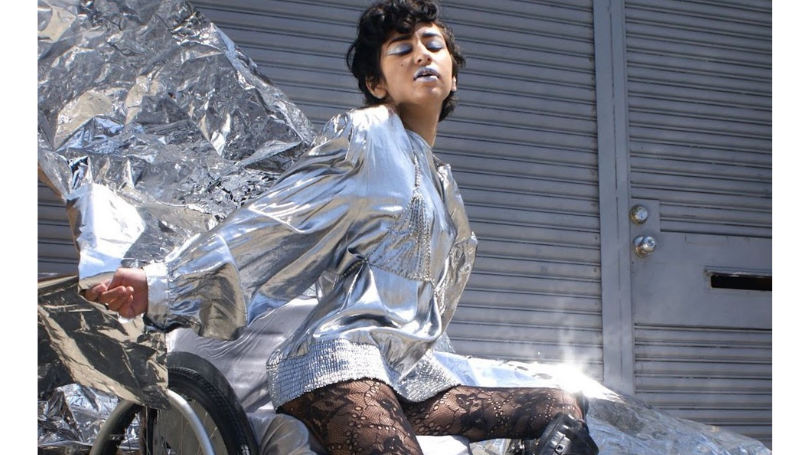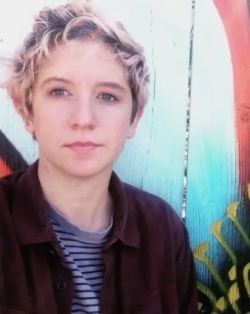

The new series of workshops, classes, lectures, and performances is designed to foster accessibility and inclusion.
On January 17, author and disability justice worker Leah Lakshmi Piepzna-Samarasinha talked with Dartmouth students about strategies for supporting friends through emotional crises. Piepzna-Samarasinha's latest book, The Future Is Disabled: Prophecies, Love Notes and Mourning Songs, documents the many ways disabled people kept one another alive during the COVID-19 pandemic.
Later that month, faculty, staff, and students from across campus convened to discuss the book as part of Dartmouth's inaugural Disability Justice Study Group. A second session focused on strategies for making classrooms more accessible, with guided discussion of the book Academic Ableism by Jay Dolmage and the Accessible Syllabus website by Anne-Marie Womack.

The well-received events are part of a new campus series that celebrates disability culture and fosters accessibility and inclusion. Led by Julia Havard, a postdoctoral fellow at the Leslie Center for the Humanities and the Department of Theater, the "Crip Futures" series encompasses workshops, classes, lectures, and performances related to the experience of disability.
In their scholarship, performance work, and teaching, Havard explores disability at the intersection of race, gender, sexuality, and activism. A dancer, they co-founded the Bay Area Disabled Dance Collective. This spring, Havard is teaching Disability Arts and Activism, which culminates in student research projects that craft interventions to make local art spaces more accessible.
In a Q&A, Havard discusses the impetus for the "Crip Futures" series, feedback from the Dartmouth community, and the power of "disability kinship."
What was the impetus for the "Crip Futures" series?
I wanted to highlight the expansive and creative scholarship and art that are a part of disability culture. My sense is that Dartmouth faculty, staff, and students are hungry for disability culture programming that positions disability as the identity that it is, rather than a medical, legal, or administrative problem.
Also, as a visibly disabled person, I've felt hyper-visible and simultaneously very alone. I think a lack of programming, classes, and representation keeps disabled people at Dartmouth isolated from each other. This perpetuates the perception that there are no disabled people here, and that issues around ableism do not need to be addressed. My hope is that an infusion of conversations around access and disability will encourage some shifts on campus.
Many people are working together across campus to address accessibility issues. I've been collaborating on this series with people from a variety of campus organizations, including the Leslie Center, Analola Santana and Laura Edmondson in the Theater department, and Mingwei Huang in Women, Gender and Sexuality Studies. The Disability Justice Study Group emerged from a team of organizers from Women, Gender and Sexuality Studies, DCAL, the Academic Skills Center, and the Accessible Dartmouth Initiative.
There is also an urgent need for systemic, administrative, and policy-based changes around access as well.
In many contexts, "crip" is an offensive term. How do you explain its resurgence as an affirmation?
"Crip" is a reclamation of the slur "cripple" and refers to a politicized experience of disability. It can also serve as a marker of pride in disability as identity. By emphasizing the importance of disability as identity rather than pathology, disabled people's social, political, and creative contributions can be understood as making up a rich and varied disability culture.
Crip theory takes into account the ways that norms around sexuality and gender are entangled with norms around body and ability and cites the importance of intersectional analysis of differences in race, size, gender, and class across disability.
How has this series been received by the Dartmouth community?
I have had powerful conversations with people across campus about their experiences with ableism and isolation at Dartmouth and their deep desire for disability kinship. I think it means a lot here to know you're not alone.
Participants in our recent disability dance workshop told me that it was beautiful and restorative, providing a spacious environment for choreography that takes into account neurodivergent and disabled modes of movement. The Disability Justice Study Group meetings have been packed and full of questions, connections, and new collaborations. Attendees have told me that they were grateful to have a space to think through the complex questions that arise around ableism as it intersects with racism in the classroom.
I have also heard from attendees at a DCAL presentation I co-facilitated with Accessible Dartmouth Initiative's Carly Lesoski on UDL and crip pedagogy that this was not an intersection they had thought about previously, and that it continues to have ripples in the ways they think about their teaching.
By approaching disability culture across art, pedagogy, and social change, Crip Futures has brought a lot of people into conversation who wouldn't ordinarily cross paths. I hope some of these connections grow into future coursework, creative projects, or even the development of a disability community space.
The movement toward creating more just worlds needs people from every social position, valuing every person's unique assets and resources, to abolish the ableism that is so prevalent both across our cultural landscapes and within ourselves.
Is there an upcoming event that you're especially excited about?
I'm counting down the days to Caleb Luna's poetry reading on April 6 from their new book, Revenge Body. Dr. Luna is a brilliant performance studies scholar who writes about sexuality, media, size, race, and disability. They are also a beautiful poet and renowned fat activist. I can't wait for this campus to get to know their graceful, creative, and exuberant self!
We'll be providing snacks and drinks and will get to hear Dr. Luna read from their book in an informal, cafe-type setting at the Leslie Center. Anyone interested in more information can sign up for updates and check out upcoming events on the Crip Futures website.